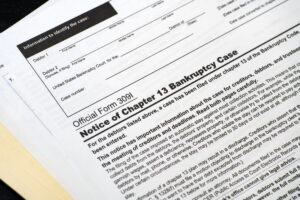If a creditor has gotten judgment against you before you file bankruptcy, it’s possible that he may also have a judgment lien. In Colorado, in order to do so creditor must file a transcript of judgment with a county clerk and recorder in whichever county you reside and possibly any county in which you own real estate. If a creditor has a judgment lien recorded, when you sell your property, you will have to pay that creditor the amount of his lien (although you might be able to settle for a lesser amount).
When you file bankruptcy, a judgment lien will not automatically be eliminated. Your attorney must file a Motion to Avoid Lien. Section 522(f) of the Bankruptcy Code provides:
(1) Notwithstanding any waiver of exemptions but subject to paragraph (3), the debtor may avoid the fixing of a lien on an interest of the debtor in property to the extent that such lien impairs an exemption to which the debtor would have been entitled under subsection (b) of this section, if such lien is—(A) a judicial lien, other than a judicial lien that secures a debt of a kind that is specified in section 523(a)(5); or(B) a nonpossessory, nonpurchase-money security interest in any—(i) household furnishings, household goods, wearing apparel, appliances, books, animals, crops, musical instruments, or jewelry that are held primarily for the personal, family, or household use of the debtor or a dependent of the debtor;(ii) implements, professional books, or tools, of the trade of the debtor or the trade of a dependent of the debtor; or(iii) professionally prescribed health aids for the debtor or a dependent of the debtor.(2)(A) For the purposes of this subsection, a lien shall be considered to impair an exemption to the extent that the sum of—(i) the lien;(ii) all other liens on the property; and(iii) the amount of the exemption that the debtor could claim if there were no liens on the property;exceeds the value that the debtor’s interest in the property would have in the absence of any liens.(B) In the case of a property subject to more than 1 lien, a lien that has been avoided shall not be considered in making the calculation under subparagraph (A) with respect to other liens.(C) This paragraph shall not apply with respect to a judgment arising out of a mortgage foreclosure.


